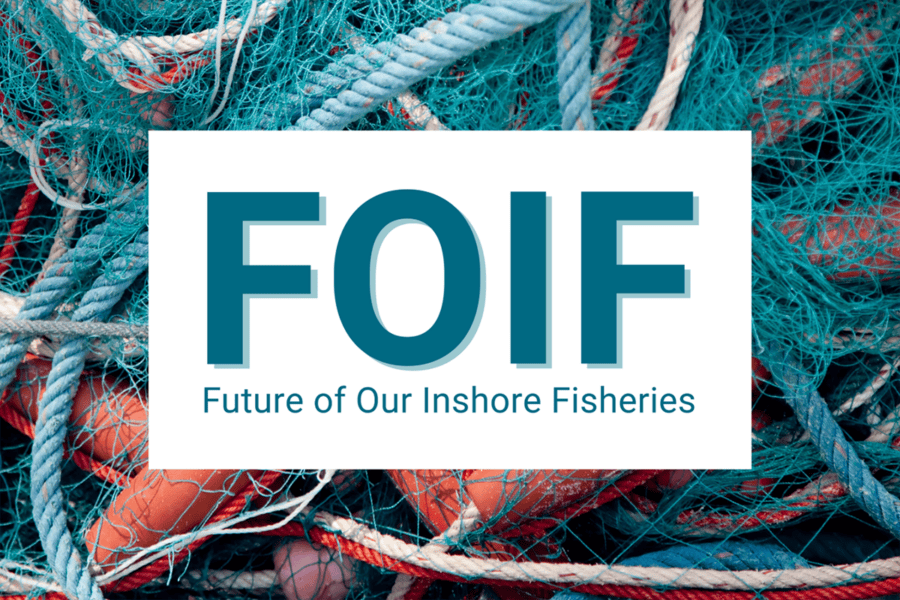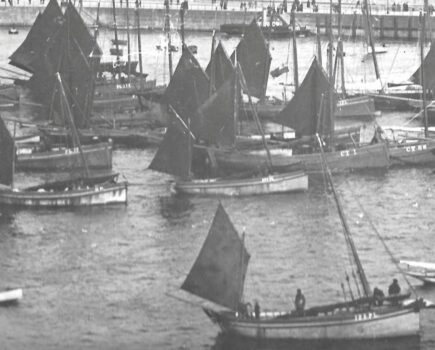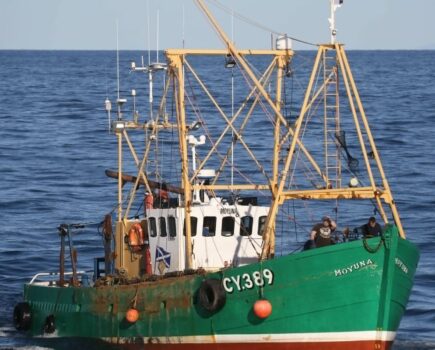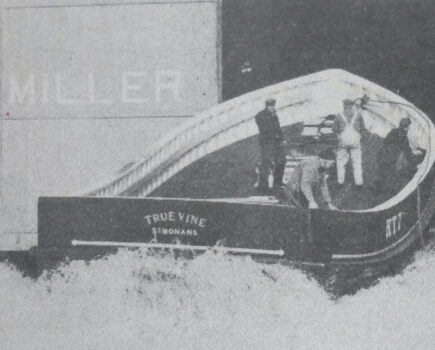Fiona Birch and Sara Mynott get below the surface of the ambitious project to transform the way inshore fisheries are managed in the post-Brexit era
Big steps are afoot for the trailblazing Future of Our Inshore Fisheries (FOIF) project, which is paving the way for thriving and resilient inshore fisheries. During the past three years, the project has laid the foundations for much-needed reforms of the UK’s inshore fisheries management system, in order to place working fishermen at the very centre of decision-making.
London, October 2019: 180 fishing industry stakeholders gathered in a packed-out room, including active inshore fishermen, scientists, regulators and government representatives, for the Future of Our Inshore Fisheries (FOIF) conference.
The goal? To establish a ‘business plan’ for collaborative management in fisheries, drawing on the vital expertise and experience of inshore fishermen, to deliver a sustainable and profitable fishing industry and support flourishing coastal communities.
Fast-forward three bumpy years, beset by the challenges of Brexit and Covid-19. Seafish, alongside the UK fishing industry, Defra and the MMO, have kept the wheels turning. Fuelled by the energy of the conference, they have created a work programme to develop practical fisheries management solutions. The positive sentiment garnered at the conference has not gone to waste.
Founding member of the FOIF Steering Group Barrie Deas, chief executive of the National Federation of Fishermen’s Organisation, commented: “Despite the challenges posed by Covid and the UK’s departure from the EU, FOIF has continued to move forward.
“It’s interesting to see how many initiatives were spawned by those few days in London, when inshore fishers from around the coast at last had their say – the Shellfish Industry Advisory Group, and a much stronger dialogue between Defra, the MMO and coastal fishers through the regional inshore groups are two important examples.
“There is a lot more work to do, especially against the backdrop of Fisheries Management Plans and the challenges and opportunities that they pose.
“A lot of ground-clearing has been necessary. It’s not possible to manage fisheries well without good information. I am sure, however, that FOIF will continue to build on the important foundations that have now been laid.”
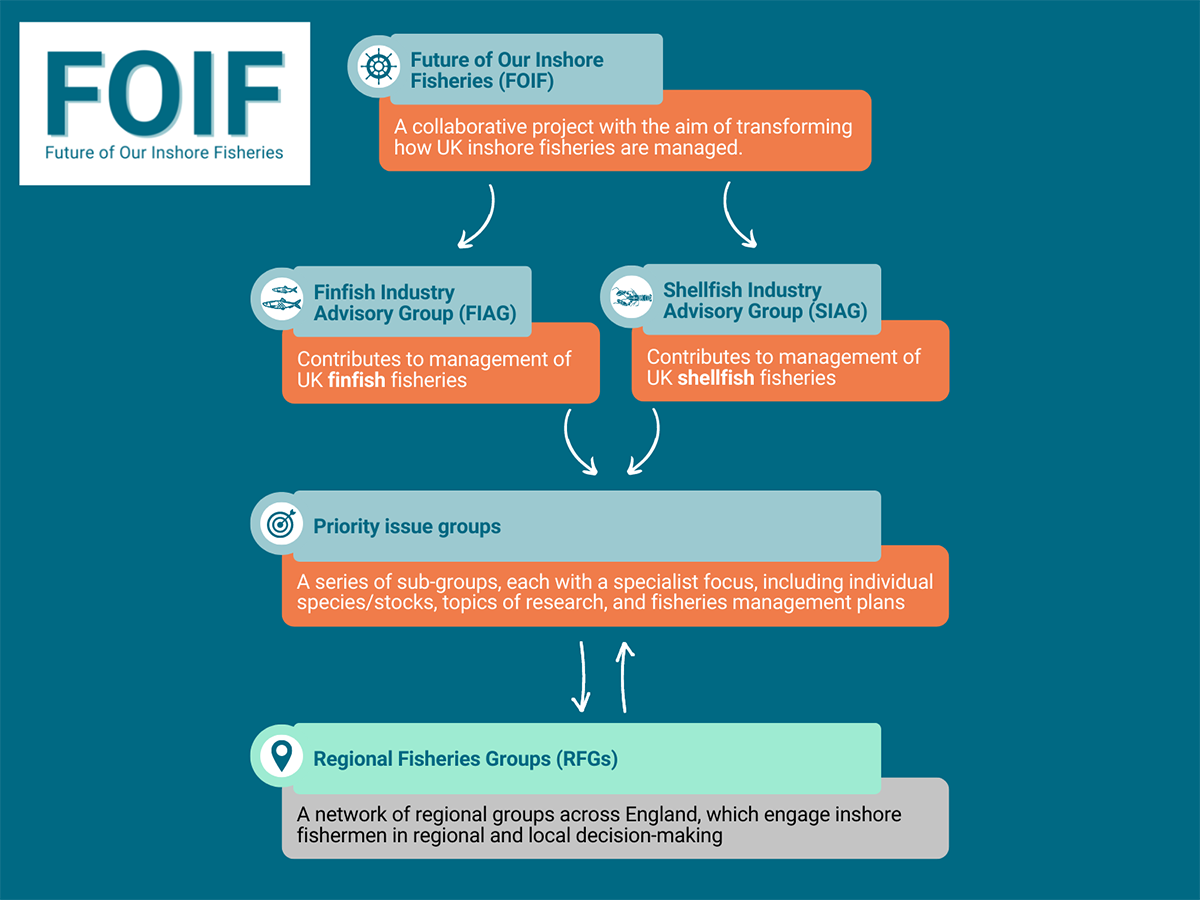
A system of groups has been set up to distribute the work of the Future of Our Inshore Fisheries project across shellfish and finfish fisheries. This diagram shows the links between the groups.
Based on the lessons learned in London, the FOIF Steering Group – which includes inshore fishermen, POs, regulators and scientists – agreed an action plan to lay the foundations for the future work of FOIF. Central to the action plan are partnership, collaboration and enabling co-management in fisheries.
On the theme of co-management, Aoife Martin, director of operations at Seafish and chair of the Whelk Management Group, observed: “This is a journey that will require industry, government and scientists to work together differently.
“FOIF provides a solid foundation to encourage all parties to collaborate – to share ideas and to find solutions to complex problems. It will mean sharing responsibility and accountability for difficult decisions, taking the time to fully understand the wider impact of those decisions on businesses, and making changes to minimise these impacts as much as possible.
“It will require everyone to work collaboratively for the greater good of our fisheries. There will still be disagreements and frustrations, on all sides, but these good foundations should mean that the value of working collaboratively will win out.”
The Shellfish Industry Advisory Group (SIAG) provides a forum to discuss the weightiest issues facing whelk, crab, lobster and scallop fisheries, and their sustainable management. Similarly, the Finfish Industry Advisory Group (FIAG) focuses on UK non-quota finfish stocks (NQS), including bass and flatfish.
The Regional Fisheries Groups (RFGs) network runs in parallel to FOIF as a formal method of engagement for the inshore fishing fleet. The RFGs allow fishermen to play an active role in regional and local decision-making. Where relevant, RFGs support the work of FOIF, and vice versa.
Operating under the SIAG, priority issue groups focused on crab, lobster and whelk management are collaborating with Defra to draft some of its first Fisheries Management Plans. The plans set out practical measures to ensure that each fishery is sustainable and profitable, and supports livelihoods. FOIF is now ensuring that the real-world experiences of active fishermen inform the project every step of the way.
Anne Freeman, deputy director of domestic fisheries and reform at Defra, said: “Reforming our inshore fisheries is a long-term project, and change won’t happen overnight. It’s been great to witness the open and productive working spirit forged between FOIF stakeholders so far.
“Fishermen from all over the UK are invited to engage as much or as little as they wish. We know fishermen have to go fishing, and don’t have time to attend meetings or read long documents. That’s why there are lots of ways to engage individually or through groups or representative organisations.
“This is an opportunity for fishermen to make themselves heard and play an active role in shaping how post-Brexit fisheries will work.”
Interested in learning more about FOIF or ways to get involved? Contact Rebecca Treacy from the Seafish Fisheries Management Team on rebecca.treacy@seafish.co.uk or 07971 310316.
What is Future of Our Inshore Fisheries?
Future of Our Inshore Fisheries (FOIF) is an industry-led project with the long-term aim of transforming how inshore fisheries are managed.
Launched with the support of Seafish in 2019, it brings together active fishermen with industry leaders, policy-makers, regulators and researchers to lay the foundations of post-Brexit fisheries through co-management, science and cross-sector engagement.
Voice from the industry
We spoke to Beshlie Pool, executive officer of South Devon and Channel Shellfishermen Ltd, about her experience of engaging with Future of Our Inshore Fisheries.
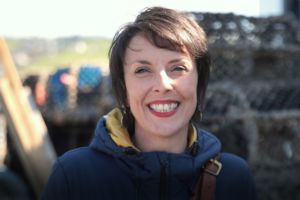
Beshlie Pool.
She said: “As soon as the FOIF conference was announced, our members signed up with the hope of influencing positive change.
“South Devon and Channel Shellfishermen Ltd has a long- standing commitment to working with both regulators and the scientific community. As our members are primarily fishermen with extremely busy and complex life commitments, I continue to attend group meetings when they are unable to, and feed back both to them and for them.”
Discussing the concerns of the inshore industry, she said: “Our smaller-scale fleets in particular are going through a very difficult time.
“The issues that our inshore members face are broadly similar to those being faced by many within the UK fleet – extreme stress as a result of a deluge of new, fast-paced policy and regulation, which is in some cases costly and/or difficult to comply with; concerns about the future effects of displacement as a result of the government fast-track of wind energy and new MPA measures; the rise in fuel prices, which is translating as increases in the price of bait for our fleet too; and concerns about the long-term sustainability of the fishery as a result of years of policy inertia.”
She added: “The tasks ahead are difficult and will take time – relationships with regulators need to be rebuilt, and collective forums like FOIF and its commitment to co-management will hopefully enable that. Through FOIF, we value the opportunity to contribute to discussions in a more open and structured way than was previously available.
“Probably the best thing about the groups is feeling supported by similar fleets in different geographic regions – we all face similar issues, and we all want to work towards meaningful change.”
She concluded: “The project is called Future of Our Inshore Fisheries, yet by necessity (largely due to the work needed to prepare FMPs as a result of EU exit), the work of the sub-groups needs to consider UK fishing holistically, as a whole.
“I hope that in time, these work streams will be able to actively engage artisan fishing operators, as they are the lifeblood of many working coastal communities, and their expertise and knowledge is vital for securing a better future for UK fishing.”
This story was taken from the latest issue of Fishing News. For more up-to-date and in-depth reports on the UK and Irish commercial fishing sector, subscribe to Fishing News here or buy the latest single issue for just £3.30 here.

